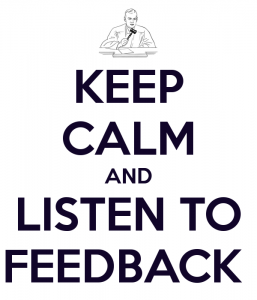A few days ago, we noticed the debate Twitters-verse buzzing about one of the worst parts of competing – the unhelpful reason for decision [RFD]. What do we mean by that? You know the drill: your debate just ended, you’re anxiously waiting to find out how you did and the judge opens with …
“I think that both teams did really well. I mean, seriously, everyone was really good. Anyway I voted negative. Thanks guys.” with minimal explanation. What’s that about anyway? In the moment, you want more information and get very little. You wonder how, if you did so well, you could possibly lose. It’s unsatisfying for you, difficult to explain to your coaches, and often (surprisingly) unsatisfying for the judge as well. What started this trend toward positive, if shallow, feedback? As J.T. O’Donnell and Dale Dauten explain on Careerealism, we’ve developed a fear of criticism and it’s hurting us:
What is the absolute easiest response to an employee’s work? The one thing that they always agree with and takes the least time to prepare and the least follow-up? It’s ‘Great work.’ You say that to someone and they never disagree, never argue, never say, ‘What do you mean?’ and never make excuses or offer explanations. It’s fast and easy and that’s why it’s overdone.
Add in those other things we talked about, like believing in positive reinforcement and being liked, and you have the perfect formula for happy mediocrity.
On the other hand, when you take the time to criticize, THAT’S the real compliment. Why? Think of the underlying message you’re sending to the person you’re talking to:
- I think enough of you that I’m willing to take my time to truly analyze your work and really pay attention.
- I believe you can get better, that I see you as improving and growing in your work and career. Via Careerealism.
Why do judges do this? Sure, some of them are just too lazy or tired to work hard enough to give you feedback, but oftentimes there’s more to it than that. Many of them take the shortcut because you’ve shown them, one way or another, that you won’t take criticism well and they just don’t think it’s worth it to fight with you. If you’re feeling defensive at that last statement, consider for a moment how true it might be.
It’s easy to be scared of criticism. Public speaking can be terrifying and, after all your hard work, you do not want to hear that you have come up short in any way. Unlike football or chess, when you put your “speaking self” out there, you’re quite literally opening yourself to criticism of the way you present yourself to the world. That feels really personal. Your defensiveness, however, will hold you back from improving. How to fix it?
 All joking aside, you need to consider the following steps:
All joking aside, you need to consider the following steps:
1. Remember that the judge is talking about a single debate, not your season-long effort. No one is drawing conclusions about what kind of worker you are or how “good” or “bad” at debate you are based on your performance in one round. Rather, they’re evaluating your choices over the last hour or so and deciding where you went wrong or went right. Don’t give the RFD more power than it deserves.
2. Now that you’re chilled out, act chilled out. If you spend the entire debate over-reacting, panicking, and nervous, the judge will get the message that you’re not really in the state of mind to hear their genuine opinion of how you’ve done. Judges are human – they don’t want to hurt people’s feelings. They do the job they do because they want you to learn an important skill and how to do it better.
3. Show them respect while they’re talking to you. People want to help people who seem to want their help. If you’re devastated, eye-rolling, cutting them off and otherwise shutting down the conversation, it’s unlikely they’ll want to help you. Write things down. Nod occasionally as though you understand. Listen actively and take their feedback seriously. Make eye contact. If you lost, you’re disappointed, but you have plenty of time to be disappointed on the bus ride home. Right now, you’re learning.
4. Solicit the feedback you want. Some judges, particularly inexperienced judges, will still be uncomfortable giving you their honest opinion no matter what you do. In those cases, ask them open-ended questions – but remember to focus on how you can improve. For example:
“I think I thought we were further ahead on the disadvantage than you did. Can you give me some ideas about how I should explain the impact better in the future?”
“I can see how I may have spent too much time on the overview. How would you suggest I tie this 2NR together without being so top-heavy?”
Stay open, stay friendly, and remember — the quotation above is correct. When a judge is criticizing you, they are giving you the highest compliment possible. They’re showing you that they’re working hard to make you better, that they’re invested in your success, and that they want to help. Happy competing, all – it’s TOURNAMENT FRIDAY!

Pingback: The One-Second Change That Will Dramatically Improve Your Speeches « Free Debate Resources | Debate Central
Pingback: Guest Post: How to Become Autonomous in Your Forms of Argumentation « Free Debate Resources | Debate Central
Pingback: The 12 Best Debate Tips We’ve Ever Heard « Free Debate Resources | Debate Central